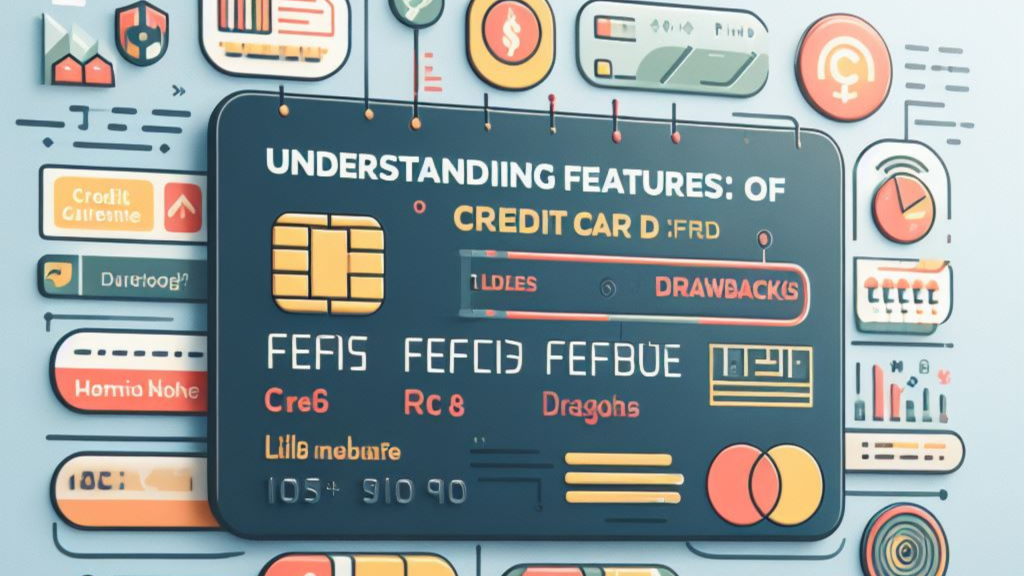Features Of Credit Cards : A credit card serves as a payment card, providing users with a convenient means of payment. It permits cardholders to make purchases of goods and services with the commitment to settle the charges later. The card issuer establishes a revolving account and extends a line of credit to the cardholder, enabling them to borrow funds for transactions with merchants or obtain cash advances.
It’s important to note that a credit card should not be confused with a charge card, where the balance must be paid in full every month. Unlike charge cards, credit cards allow consumers to maintain an ongoing balance of debt, which may incur interest charges. Furthermore, credit cards are distinct from cash cards, which function as a form of currency for the cardholder.

One significant difference between a credit card and a charge card lies in the involvement of third-party entities. In the case of a credit card, a third party pays the seller on behalf of the buyer and is later reimbursed by the buyer, while a charge card merely postpones the buyer’s payment until a later date.
इस पोस्ट में क्या है ?
Features Of Credit Cards
The concept of credit cards originally emerged from travel agencies and was later adopted by banks. These cards, often crafted from plastic material, are commonly referred to as “plastic money.” Credit cards are financial instruments issued by banks or financial companies, granting cardholders the flexibility to borrow funds, typically at the point of sale. They come with associated interest charges and are predominantly utilized for short-term financing. The interest accrual typically commences a month after the purchase is made, and borrowing limits are predefined based on the individual’s creditworthiness. Features Of Credit Card
Key Features of Credit Cards
- Multiple Parties: The credit card system involves three main parties – the issuing bank, the account holder who uses the card, and the establishments that accept these cards as a means of payment for goods and services.
- Specific Eligibility: Credit cards are issued to customers with assured and substantial income and those who maintain a good account history.
- Standardized Size: Credit cards come in a standard size and thickness.
- Embossed Details: Details such as the cardholder’s name, account number, and validity date are embossed on the card, allowing verification through an imprinter machine.
- Specimen Signature: Credit cards also bear the specimen signature of the cardholder.
Advantages of Credit Cards
- Convenient Purchasing: Credit cards enable users to make purchases and obtain services, such as those from hotels, railway stations, and airlines, up to a specified credit limit.
- Efficient Transactions: Cardholders sign invoices, which are then sent to the bank for payment to the seller or service provider. The bank subsequently recovers the funds from the account holder. This eliminates the need to carry large amounts of cash, especially during travel.
- Additional Uses: Some banks permit cash withdrawals from their branches, and credit cards can be used for various payments, such as telephone bills or jewelry purchases.
- Business Expansion: Accepting credit cards can boost a business’s revenue, and banks may earn higher interest rates or fees. Establishments that accept credit cards typically enter into agreements with banks, verifying the card’s authenticity using imprinter machines.
In India, credit cards have not only become a financial tool but also a status symbol, although they are more common in foreign countries.
Disadvantages of Credit Cards
- High-Interest Rates: Credit cards often come with exorbitant interest rates, particularly for unpaid balances, which can be as high as 20%, making them costlier than regular bank loans.
- Perception of “Free Money”: Credit cards can create a false sense of free money, tempting users to overspend on unnecessary items. The act of signing a piece of paper can feel disconnected from the financial responsibility of paying in cash, making budgeting difficult.
- Risk of Unpaid Balances: Since credit card billing occurs monthly, it’s easy to lose track of spending within the same month, leading to overspending. Over time, unpaid balances can accumulate significant interest, potentially resulting in long-term debt issues.
- Credit Card Theft and Fraud: Credit cards are susceptible to theft and fraud, posing a substantial risk. Modern thieves don’t necessarily need the physical card; they can misuse card numbers to drain bank accounts. Regularly reviewing monthly statements is crucial to detect any signs of fraud promptly.
Features Of Credit Card FAQ
You can apply for a credit card online through the bank’s official website or by visiting a local branch. The application process usually involves providing personal and financial information.
Eligibility criteria vary among banks but generally include factors like age, income, credit score, and employment status. Check with the specific bank for detailed eligibility requirements.
Credit cards come in various types, including rewards cards, cashback cards, travel cards, and secured cards. Each type offers different benefits and features, catering to diverse consumer needs.
The approval time varies by bank and can range from a few days to a few weeks. Banks assess your application based on factors such as credit history, income, and existing debts.
The credit limit is the maximum amount you can borrow on your credit card. Banks determine this limit based on your creditworthiness, income, and other financial factors.